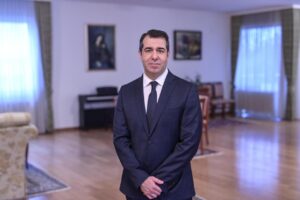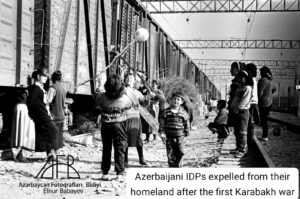In the early 1990s, Armenia occupied about 20 % of the territory of Azerbaijan.
At that time, approximately 250 thousand Azerbaijanis were forcibly expelled from Armenia and 750 thousand from our occupied lands, for Diplomacy&Commerce says H.E. Anar Imanov Ambassador of Azerbaijan to Croatia. The cities and villages of Azerbaijanis subjected to ethnic cleansing were completely destroyed. Despite the documents adopted by international organizations regarding the conflict, including 4 UN Security Council resolutions demanding the immediate, complete, and unconditional withdrawal of Armenian armed forces from the territories of Azerbaijan, the occupation continued for nearly 30 years, says Ambassador Imanov. Also, this year, Azerbaijan and Croatia are marking 30 years since the establishment of diplomatic relations.

- In 2025, Azerbaijan and Croatia celebrate the 30th anniversary of diplomatic relations. What would you say about the current state and development prospects of relations between our countries?
Azerbaijan and Croatia enjoying the relations of traditional friendship and strategic partnership. I am pleased to note that cooperation between our countries has been actively developing in all areas in recent years. An important role in strengthening bilateral Azerbaijani-Croatian relations is played by a significant increase in mutual contacts and visits, including at the highest level. Just in last one and half year, Croatian Prime Minister Mr. Andrej Plenkovic visited Azerbaijan twice – in November 2023 he paid an official visit, and in November 2024 he took part at COP29 Summit in Baku. Moreover Prime Minister Mr. Andrej Plenkovic and President Mr. Ilham Aliyev met twice in framework of Davos forum in 2024 and 2025. Of course, warm, friendly relations and frequent meetings of the leaders of our countries play a key role in strengthening bilateral relations. Also we have significant increase in mutual visits in ministerial level as well as between parliaments. Energy cooperation is the main driver of bilateral economic cooperation between our countries. Azerbaijan supplies Croatia with oil, thus playing an important role in Croatia’s energy security. Both countries are also developing gas cooperation, so I hope to see soon significant progress in this area as well. Also opportunities for improvement lie in areas such as renewable energy, where both countries could collaborate to address climate goals. Recently, discussions have highlighted the prospects for cooperation in green energy, showcasing Croatia’s expertise in sustainable technologies that align with Azerbaijan’s diversification efforts. Additionally, sectors like IT, shipbuilding, pharmaceuticals, and agriculture offer significant scope for businesses of our countries to further engage. There is a huge potential for cooperation in the area of mutual investments. Azerbaijan has already shown interest in investing in Croatia. We also hope to attract Croatian investments to our country, especially in light of the good, very attractive conditions created in our country for investors. Enhanced cultural exchanges and easing travel restrictions could also foster greater people-to-people connections. Croatia’s advocacy for EU-Azerbaijan relations and its expertise in mine clearance could further solidify its role as one of the key strategic partners of Azerbaijan in EU.
In 2025, we are celebrating the 30th anniversary of the establishment of diplomatic relations between Azerbaijan and Croatia, and both sides are working hard to give additional impetus to bilateral cooperation in this special year. I am convinced that our joint work with Croatian friends will definitely lead to a significant expansion and deepening of bilateral cooperation in all areas.
- Mr. Ambassador, as far as we know, progress has been made in the normalization of relations between Azerbaijan and Armenia at a time when conflicts have been taking place in various parts of the world recently. What can you say about this?
As it is known, in the early 1990s, Armenia occupied about 20 % of the territory of Azerbaijan. At that time, approximately 250 thousand Azerbaijanis were forcibly expelled from Armenia and 750 thousand from our occupied lands. The cities and villages of Azerbaijanis subjected to ethnic cleansing were completely destroyed. Despite the documents adopted by international organizations regarding the conflict, including 4 UN Security Council resolutions demanding the immediate, complete, and unconditional withdrawal of Armenian armed forces from the territories of Azerbaijan, the occupation continued for nearly 30 years. Azerbaijan ended the occupation during the 44-day Patriotic War in the fall of 2020, and as a result of local anti-terrorist measures lasting 23 hours in September 2023 restored its sovereignty over its entire territory. Despite the numerous war crimes committed against its population, the complete destruction of hundreds of cities and villages, and the great damage inflicted on its historical, cultural and religious sites, it was Azerbaijan that initiated the signing of a peace treaty. As a result of lasting negotiations, a peace treaty between Azerbaijan and Armenia was fully agreed upon a few weeks ago and is ready to be signed.
Azerbaijan has two pre-conditions for signing this document:
- Dismissal of the OSCE Minsk Group, which was established in the 1990s to resolve the conflict, and has not led to any achievements. It is apparent that this organization, which was created to resolve the conflict that has already been resolved, has completely lost its relevance;
- Amendments to the provisions of the Armenian Constitution that reflect territorial claims against Azerbaijan. The Preamble of the Constitution of Armenia refers to the Declaration of Independence of Armenia, and it clearly mentions the annexation of the Karabakh region of Azerbaijan to Armenia. As a result, any peace treaty signed between Azerbaijan and Armenia would conflict with the Constitution of Armenia, rendering the treaty void. To prevent this situation, it is necessary to make amendments to the Constitution of Armenia by eliminating any provisions reflect claims against the territorial integrity of Azerbaijan.
Azerbaijan’s goal is to achieve lasting peace with neighboring Armenia, for which both conditions we put forward are of great importance.

3.Some international media outlets are reporting on the ongoing Azerbaijani trial process of several individuals of Armenian origin. What would you like to say about this issue?
The individuals of Armenian origin have been brought to trial for various offenses. They include former leaders of the so-called Nagorno-Karabakh Republic, established by Armenia in the occupied territories of Azerbaijan and other detainees of Armenian origin either have been charged or convicted of genocide, war crimes, ethnic cleansing, military aggression, torture, financing separatism and terrorism, and other serious offenses. Azerbaijan has rights and obligations to investigate and prosecute these offenses under the Geneva Conventions and generally under international and domestic law. These detentions have a proper legal basis and do not impair the detainees’ rights. Regular visits by representatives of the International Committee of the Red Cross and telephone and video calls with family members were facilitated. It is well-known that Azerbaijan, both as a humanitarian gesture and consistent with its obligations under international humanitarian law since the 2020 war, has released and repatriated more than 200 Armenians in its custody who were entitled to prisoner-of-war status or considered detainees. However, following Azerbaijan’s return of prisoners-of-war, some of them passed through imprisonment and interrogation carried out by Armenian authorities. Also Azerbaijan has also made a huge gesture by allowing more than 10,000 illegal Armenian armed forces to lay down arms and leave the territories of Azerbaijan following the 2023 anti-terror measures conducted by Azerbaijan. I want to note that we are certainly surprised to hear statements from some European politicians who are closely connected with the Armenian diaspora demanding the release of the mentioned individuals. How can one ask for the release of people who committed brutal crimes, those guilty of the deaths of innocent women, children and elderlies? For instance, one of the leaders of the separatists, Arayik Harutyunyan, ordered the bombing of a number of cities, including Ganja, the second largest city in Azerbaijan, as a result of which a large number of civilians, including women and children, were killed and great destruction occurred. A. Harutyunyan openly admitted on television that he had given the order. Thus, this person committed acts considered a crime under international humanitarian law and Azerbaijani legislation and admitted it. There is no moral or legal basis for demanding his release. Or another example. During the occupation of Azerbaijan, the town of Khojaly was utterly destroyed by Armenian military units, and more than 600 people, mainly women, children, and the elderly, were brutally murdered. Some of the perpetrators of this genocide are currently on trial, some of them have even already admitted their participation in mass killings. International law not only grants states the right but also imposes on them the duty to bring to justice those who committed such serious crimes as genocide, war crimes, and crimes against humanity. So, calling for the release of these individuals is in itself contrary to international law. In all cases, I have no doubt that, those who committed crimes against the state and people of Azerbaijan during the brutal aggression of Armenia will receive their deserved punishment.
- The biggest threat to security in Europe right now is Russia-Ukrainian war. What is Azerbaijan’s position on this?
In answering this question, I would like to quote the President of Azerbaijan, Mr. Ilham Aliyev, who touched on this topic during his speech at International Forum themed “Facing the New World Order” on April 9, 2025 in Baku: “Regarding our position on the war between Russia and Ukraine, we have always supported and will continue to support Ukraine’s territorial integrity and sovereignty. As a country that has suffered from occupation and the undermining of our territorial integrity, we fully understand this situation.” Since the very first days of the conflict, our country has been providing humanitarian assistance to Ukraine. In the early days of the Russian army’s entry into Ukrainian territory, since February 2022, the gas stations of the Azerbaijani state company SOCAR located in Ukraine have provided free fuel to Ukrainian emergency vehicles, including ambulances and fire trucks. Despite the need to rebuild hundreds of cities and villages destroyed by Armenia in Azerbaijan, our country has contributed to the reconstruction works in Ukraine, ensuring the rebuilding of several social facilities, including schools and hospitals. Our country has made a significant contribution to the restoration of Ukraine’s energy system, and a large number of generators and other equipment have been sent to Ukraine. Also in recent years Azerbaijan has sent a large quantity of medicines and medical equipment to Ukraine. Azerbaijan has received hundreds of Ukrainian children for medical and socio-psychological rehabilitation. We are sure that any humanitarian assistance to Ukraine is of great importance in the current situation, and we will continue this support. I would also like to add that we in Azerbaijan hope that this war, which has caused such a large number of casualties and extensive destruction, will end soon.